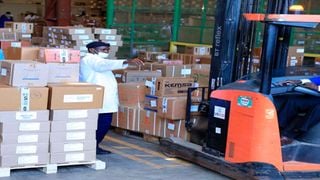
A USAID antiretroviral drugs consignment at the Kemsa warehouse in Embakasi, Nairobi, on April 22.
| File | Nation Media GroupNews
Premium
Standoff as Kemsa loses Sh70bn contract with US
What you need to know:
- Recent procurement scandal at the agency sealed fate of agreement.
- Health ministry refuses to allow the US government to work through Chemonics, an American firm.
The State medical supplier has lost a Sh70 billion five-year contract to procure, warehouse and distribute essential drugs on behalf of the American government.
The Nation has established that what started as a minor port clearance dispute over antiretroviral drugs between Kenya and the United States has escalated, putting at risk the fight against malaria, tuberculosis and HIV.
Kenya’s Health ministry has rejected the push by the US government to hand the lucrative drug distribution contract to Chemonics, an American company that has attracted its fair share of scandals around the globe.
Health Cabinet Secretary Mutahi Kagwe argues that reforming the Kenya Medical Supplies Authority (Kemsa) is a better route than taking the contract away, which is akin to throwing away the baby with the bath water.
Already, to show the government’s resolve, the ministry has replaced the entire Kemsa board, but this move may have come a little late.
The ministry also believes that giving the contract to a third party would weaken Kemsa, which buys drugs for all public health facilities in Kenya, and has spent billions of shillings to build a national supply chain.
The other card on the table is sovereignty of the country, given that this would amount to donor blackmail, arguments that the US government representatives are not buying.
But the immediate casualties of the escalating standoff are helpless patients who rely on the cheaper, donor-funded drugs to remain alive.
Donor blackmail
At the heart of the battle for the soul of Kemsa is the Sh70 billion five-year contract, which expired last year, and had been extended a few times on a month-to-month basis, but had now come up for full renewal before the US dropped the bombshell that it was not ready to work with Kemsa any longer.
The Sh7.8 billion procurement scandal at Kemsa was the last nail on the coffin of the contract, coming days after a joint report by the United States Agency for International Development (USAID) and the Global Fund raised concerns.
The Nation has established that talks between the Kenyan and US governments are going downhill.
A letter by Mr Eric Kneedler, the chargé d’affaires at the US Embassy in Kenya, reveals that US government officials in Nairobi had a virtual meeting on April 8 with CS Kagwe that discussed the US government’s engagement with Kemsa and continued support to Kenya’s medical supply chain.
But the meeting failed to iron out all the issues, with the conflict escalating in the four days to April 12 when the US stuck to its guns and opted to use Chemonics.
“As discussed on the call, after reviewing evidence and credible allegations regarding fraud and corruption identified by USAID’s office of the Inspector General, and in light of the Biden administration’s focus on combating corruption, the US government has determined that it is no longer tenable to continue working through Kemsa,” the letter addressed to CS Kagwe reads in part.
If the Global Fund takes a similar route, then Kenya’s health crisis will become worse. USAID and the Global Fund have invested substantial resources in Kemsa.
The two institutions have given Kemsa at least Sh100 billion in the past five years. The development partners heavily depended on Kemsa for procurement, warehousing and distribution of health commodities.
Form a committee
In the contract that has come to an end, USAID was supporting the Kemsa medical commodities project with funding totalling about Sh69 billion ($650 million) to procure all commodities funded by the US government for the five-year period between 2015 and 2020.
Kenya is one of the Global Fund's “high impact” countries with active signed grants of Sh40.7 billion ($384 million) for the period between January 2018 and June 2021.
The Global Fund has supported HIV, tuberculosis (TB) and malaria programmes in Kenya since 2002, disbursing to the country over Sh120.8 billion ($1.14 billion) to date.
The report notes that 60 per cent of these billions is used to procure health commodities through Kemsa. On its part , the US government through USAID entered into a contract with Kemsa medical commodities programme in 2015.
The programme aims to operate a safe, secure, reliable and sustainable supply chain management system for HIV/Aids commodities needed to provide care and treatment for persons with HIV/Aids and TB in Kenya. It also supports the warehousing and distribution of US government-funded family planning, nutrition and malaria commodities.
The US Embassy says the cutting of ties with Kemsa can be reconsidered if the government reforms the agency by strengthening and rebuilding safeguards, systems and controls in the agency.
To do this, the US wants the ministry to form a committee to address challenges at Kemsa as well as immediately resolve the regulatory approvals, VAT and other tax exemptions for the consignments.
Correspondence shows that the Health ministry was ready to work with the US government on any suggested oversight or monitoring of the donations to the Kenyan government, but it is not ready to have another company handed the Kemsa deal.
“I would like to request the Ministry of Health to designate Chemonics as an authorised agent of Kemsa as expeditiously as possible,” the letter signed by Mr Kneedler reads in part, adding that this will allow Chemonics to import, warehouse and distribute commodities during the period the US government “is not able to work with Kemsa”.





